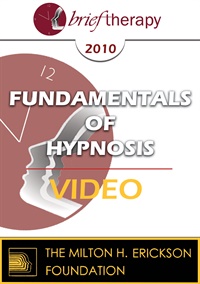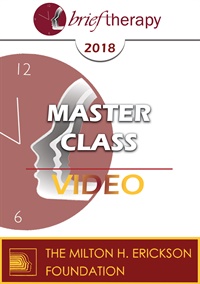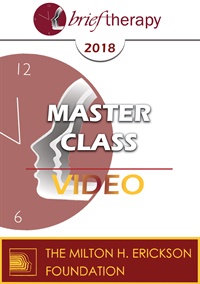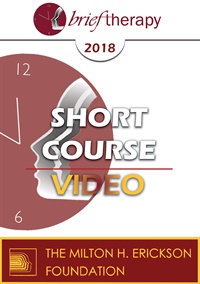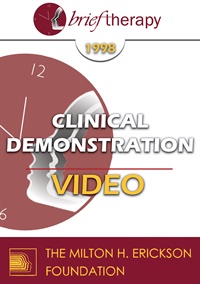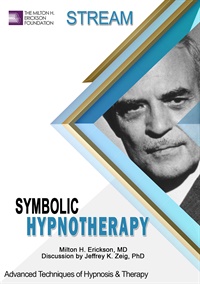
Credit available - Click Here for more information
- Average Rating:
- Not yet rated
- Topic Areas:
- Hypnosis | Advanced Techniques of Hypnosis & Therapy | Continuing Education | Ericksonian Hypnosis and Therapy Techniques | Hypnotherapy | Milton Erickson | Communication | Metaphors
- Categories:
- Advanced Techniques of Hypnosis & Therapy | Featured | Training Videos | Online Continuing Education | Milton H. Erickson Collections
- Faculty:
- Jeffrey Zeig, PhD | Milton H. Erickson, MD
- Course Levels:
- Master Degree or Higher in Health-Related Field
- Duration:
- 02:38:00
- Format:
- Audio and Video
- Original Program Date:
- Dec 31, 1977
- Short Description:
- This training tool contains segments of hypnotherapy conducted by Erickson, with the same subject, on two consecutive days in 1978. Erickson demonstrates how symbols may be used as metaphoric forms of communication to foster new ideas and understandings. Zeig discusses Erickson’s technique.
- Price:
- $75.00 - Base Price
Credit available - Click Here for more information
- Average Rating:
- Not yet rated
- Topic Areas:
- Hypnosis | Psychotherapy | Advanced Techniques of Hypnosis & Therapy | Continuing Education | Resistance | Ericksonian Hypnosis and Therapy Techniques | Milton Erickson | Confusion Technique | Naturalistic | Seeding | Hypnotherapy
- Categories:
- Advanced Techniques of Hypnosis & Therapy | Featured | Training Videos | Online Continuing Education | Milton H. Erickson Collections
- Faculty:
- Milton H. Erickson, MD | Jeffrey Zeig, PhD
- Course Levels:
- Master Degree or Higher in Health-Related Field
- Duration:
- 1 Hour 55 Min
- Format:
- Audio and Video
- Original Program Date:
- Dec 31, 1978
- Short Description:
- In 1979, Milton Erickson and Jeffrey Zeig spent five hours reviewing a demonstration that Erickson conducted at a teaching seminar. That demonstration is now available as a training video for Ericksonian practitioners. Erickson’s experiential methods include the symbolic use of hypnotic phenomena, encouraging resistance, naturalistic confusion technique, seeding, and using isomorphic anecdotes. Jeffrey Zeig discusses the mechanics of Erickson’s unique approach to psychotherapy. Working with Resistance provides an opportunity to watch a master hypnotherapist demonstrate his technique.
- Price:
- $75.00 - Base Price
- Average Rating:
- Not yet rated
- Topic Areas:
- Clinical Demonstrations | Experiential Therapy | Hypnotherapy | Brief Therapy | Psychotherapy
- Categories:
- Brief Therapy Conference | Brief Therapy Conference 2006
- Faculty:
- Jeffrey Zeig, PhD
- Course Levels:
- Master Degree or Higher in Health-Related Field
- Duration:
- 55:46
- Format:
- Audio and Video
- Original Program Date:
- Dec 08, 2006
- Short Description:
- BT06 Clinical Demonstration 01 - Experiential Hypnotherapy - Jeffrey Zeig, PhD
- Price:
-
Sale is $29.00
price reduced from Base Price - $59.00
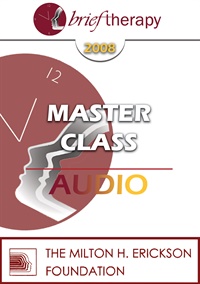
- Average Rating:
- Not yet rated
- Topic Areas:
- Master Classes | Brief Therapy | Experiential Therapy | Gestalt | Hypnosis | Ericksonian Hypnosis and Therapy Techniques | Hypnotherapy
- Categories:
- Brief Therapy Conference | Brief Therapy Conference 2008
- Faculty:
- Jeffrey Zeig, PhD | Erving Polster, PhD
- Duration:
- 2:31:17
- Format:
- Audio Only
- Original Program Date:
- Dec 15, 2008
- Short Description:
- Gestalt therapy and Ericksonian hypnotherapy are experiential methods of change. In combination they can be synergistic. Psychotherapy is best when clients have a first hand experience of an alive therapeutic process. Such dynamic, empowering experiences pave the way for dynamic understandings. Drs. Polster and Zeig will offer brief introductions to their approaches. They will demonstrate their methods through live therapeutic sessions and they will engage with each other and the participants to examine commonalities and differences in their work.
- Price:
- $15.00 - Base Price
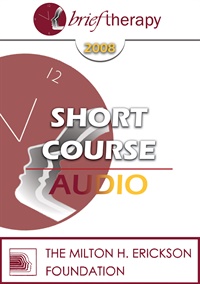
- Average Rating:
- Not yet rated
- Topic Areas:
- Short Courses | Love | Abuse | Children and Adolescent Therapy | Couples Therapy | Family Therapy | Hypnotherapy | Reframing
- Categories:
- Brief Therapy Conference | Brief Therapy Conference 2008
- Faculty:
- Ruperto Charles Torres, MA | Margarita Saez, MA | Ana Charles, MA
- Duration:
- 1:31:35
- Format:
- Audio Only
- Original Program Date:
- Dec 11, 2008
- Short Description:
- This workshop will offer a guide to understanding the inter-personal pattern of violent interactions. whether they may be between couples, parents and children, friends or co-workers. Effective strategies such as using positive questions, reframing comments, tasks, rituals and hypnotic procedures will be discussed.
- Price:
- $15.00 - Base Price
- Average Rating:
- Not yet rated
- Topic Areas:
- Hypnosis | Hypnotherapy | Fundamentals of Hypnosis | Ericksonian Hypnosis and Therapy Techniques | Utilization
- Categories:
- Brief Therapy Conference | Brief Therapy Conference 2010
- Faculty:
- Stephen Gilligan, PhD
- Course Levels:
- Master Degree or Higher in Health-Related Field
- Duration:
- 2:15:55
- Format:
- Audio and Video
- Original Program Date:
- Dec 12, 2010
- Short Description:
- This workshop provides an overview of the Ericksonian theory of utilization and then explores through demonstration, clinical examples, and a brief group exercise how to incorporate a client's processes—positive and negative associations, positive goals, desired futures, ongoing behaviors--in both the induction and utilization parts of Ericksonian hypnotherapy.
- Price:
- $29.00 - Base Price
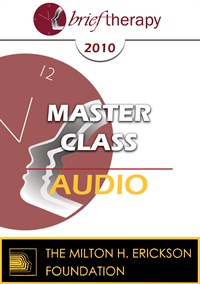
- Average Rating:
- Not yet rated
- Topic Areas:
- Hypnotherapy | Master Classes | Self-Relations | Ericksonian Hypnosis and Therapy Techniques | Psychotherapy
- Categories:
- Brief Therapy Conference | Brief Therapy Conference 2010
- Faculty:
- Jeffrey Zeig, PhD | Stephen Gilligan, PhD
- Duration:
- 2:38:40
- Format:
- Audio Only
- Original Program Date:
- Dec 13, 2010
- Short Description:
- Ericksonian hypnotherapy and the Self-Relations approach are experiential methods of change. In combination they can be synergistic. Psychotherapy is best when clients have a first hand experience of an alive therapeutic process. Such dynamic empowering experiences pave the way for dynamic understandings. Drs. Gilligan and Zeig will engage with each other and the participants to examine commonalities and differences in their work.
- Price:
- $15.00 - Base Price
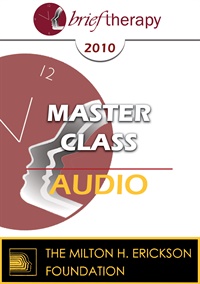
- Average Rating:
- Not yet rated
- Topic Areas:
- Master Classes | Ericksonian Hypnosis and Therapy Techniques | Self-Relations | Hypnotherapy | Psychotherapy
- Categories:
- Brief Therapy Conference | Brief Therapy Conference 2010
- Faculty:
- Stephen Gilligan, PhD | Jeffrey Zeig, PhD
- Duration:
- 2:44:28
- Format:
- Audio Only
- Original Program Date:
- Dec 13, 2010
- Short Description:
- Ericksonian hypnotherapy and the Self-Relations approach are experiential methods of change. In combination they can be synergistic. Psychotherapy is best when clients have a first hand experience of an alive therapeutic process. Such dynamic empowering experiences pave the way for dynamic understandings. Drs. Gilligan and Zeig will engage with each other and the participants to examine commonalities and differences in their work.
- Price:
- $15.00 - Base Price
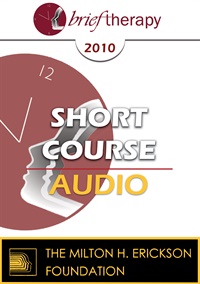
- Average Rating:
- Not yet rated
- Topic Areas:
- Hypnotherapy | Short Courses | Brief Therapy | Ericksonian Hypnosis and Therapy Techniques
- Categories:
- Brief Therapy Conference | Brief Therapy Conference 2010
- Faculty:
- Erika Chovanec, PhD
- Duration:
- 1:03:48
- Format:
- Audio Only
- Original Program Date:
- Dec 09, 2010
- Short Description:
- This workshop will introduce a holistic-motivational approach toward brief therapy, inspired by the work of Abraham Maslow. It will use lecture and demonstrations to show how hypnotherapy can aid in the utilization and encouragement of what Maslow would call Being Motivation and Metavalues in order to create lasting solutions. Participants will also learn specific forms of Ericksonian communication that may enhance Being Motivation and Metavalues.
- Price:
- $15.00 - Base Price
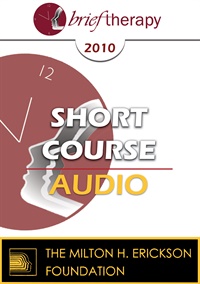
- Average Rating:
- Not yet rated
- Topic Areas:
- Children and Adolescent Therapy | Short Courses | Brief Therapy | Hypnotherapy
- Categories:
- Brief Therapy Conference | Brief Therapy Conference 2010
- Faculty:
- Charlotte Wirl
- Duration:
- 1:20:50
- Format:
- Audio Only
- Original Program Date:
- Dec 09, 2010
- Short Description:
- Brief hypnotherapy is particularly suited for children and adolescents with psychosomatic disorders, because it exploits their natural abilities to fall into trance and uses a language of symbols and metaphors. It is based on the Ericksonian belief in the abilities of a child and is astonishing in its effectiveness. With Charlotte Wirl.
- Price:
- $15.00 - Base Price
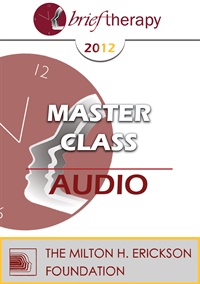
- Average Rating:
- Not yet rated
- Topic Areas:
- Master Classes | Brief Therapy | Experiential Therapy | Gestalt | Hypnosis | Hypnotherapy | Psychotherapy | Ericksonian Hypnosis and Therapy Techniques
- Categories:
- Brief Therapy Conference | Brief Therapy Conference 2012
- Faculty:
- Jeffrey Zeig, PhD | Erving Polster, PhD
- Duration:
- 2:44:44
- Format:
- Audio Only
- Original Program Date:
- Dec 10, 2012
- Short Description:
- Gestalt therapy and Ericksonian hypnotherapy are experiential methods of change. In combination they can be synergistic. Psychotherapy is best when clients have first-hand experience of an alive therapeutic process. Such dynamic empowering experiences pave the way for dynamic understandings. Drs. Polster and Zeig will engage with each other and participants to examine commonalities and differences in their work in this engaging all-day workshop.
- Price:
- $15.00 - Base Price
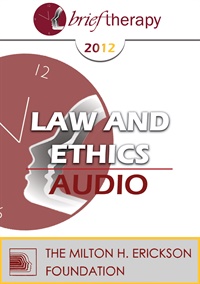
- Average Rating:
- Not yet rated
- Topic Areas:
- Master Classes | Brief Therapy | Experiential Therapy | Gestalt | Hypnosis | Ericksonian Hypnosis and Therapy Techniques | Hypnotherapy | Psychotherapy
- Categories:
- Brief Therapy Conference | Brief Therapy Conference 2012
- Faculty:
- Jeffrey Zeig, PhD | Erving Polster, PhD
- Duration:
- 2:40:44
- Format:
- Audio Only
- Original Program Date:
- Dec 10, 2012
- Short Description:
- Gestalt therapy and Ericksonian hypnotherapy are experiential methods of change. In combination they can be synergistic. Psychotherapy is best when clients have first-hand experience of an alive therapeutic process. Such dynamic empowering experiences pave the way for dynamic understandings. Drs. Polster and Zeig will engage with each other and participants to examine commonalities and differences in their work in this engaging all-day workshop.
- Price:
- $15.00 - Base Price
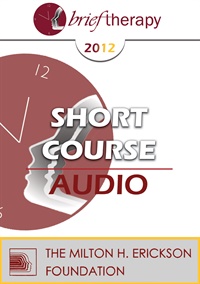
- Average Rating:
- Not yet rated
- Topic Areas:
- Hypnosis | Meditation, Spirituality and Yoga | Short Courses | Mindfulness | Buddhism | Hypnotherapy
- Categories:
- Brief Therapy Conference | Brief Therapy Conference 2012
- Faculty:
- Thomas Roberts
- Duration:
- 1:27:06
- Format:
- Audio Only
- Original Program Date:
- Dec 05, 2012
- Short Description:
- This Short Course will explore the reciprocal contributions between hypnotherapy and Buddhist/mindfulness meditation. Participants will learn how to incorporate the language of mindfulness (spaciousness, acceptance/ patience, openness, compassion) into the therapeutic/hypnotherapeutic practices, thus helping clients embrace the benefits that both have to offer.
- Price:
- $15.00 - Base Price
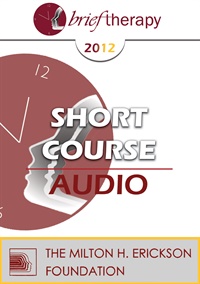
- Average Rating:
- Not yet rated
- Topic Areas:
- Hypnotherapy | Children and Adolescent Therapy | Short Courses
- Categories:
- Brief Therapy Conference | Brief Therapy Conference 2012
- Faculty:
- Tobi Goldfus, LCSW
- Duration:
- 1:18:00
- Format:
- Audio Only
- Original Program Date:
- Dec 09, 2012
- Short Description:
- BT12 Short Course 34 – Unplugging from the Outside in: Brief Strategic Hypnotherapy with Older Adolescents and Young Adults (Ages 16-25) – Tobi Goldfus, LCSW-C BCD With a plugged-in 24/7 cyberspace that demands and creates instantaneous response to internet and social networking, many young people have difficulty understanding self-regulation and present a lack of selfawareness and modulation. This workshop proposes a tailored strategic approach toward utilizing the natural creativity and novelty that young people have embedded in their development make-up but often have limited access toward using their inner resources. Experiential and specific ways to elicit responsiveness and enhance “down regulation” will be explored.
- Price:
- $15.00 - Base Price
Tags: Adolescents Children Hypnotherapy
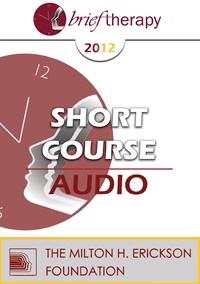
- Average Rating:
- Not yet rated
- Topic Areas:
- Hypnotherapy | Emotionally Focused Therapy (EFT) | Short Courses | Pain and Healing
- Categories:
- Brief Therapy Conference | Brief Therapy Conference 2012
- Faculty:
- Jeffrey Feldman, PhD
- Duration:
- 1:16:24
- Format:
- Audio Only
- Original Program Date:
- Dec 09, 2012
- Short Description:
- BT12 Short Course 42 – Emotion- Focused Hypnotherapy for Coping with Pain – Jeffrey Feldman, PhD This short course will introduce a treatment approach that targets the affective dimension of pain. The emotion specific wording and elicitation of positive state dependent learning can be used in a brief therapy approach whether or not patients’ feelings of anger, sadness, or anxiety are associated with physical pain.
- Price:
- $15.00 - Base Price
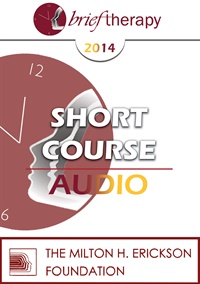
- Average Rating:
- Not yet rated
- Topic Areas:
- Short Courses | Hypnosis | Hypnotherapy | Self-Hypnosis | Ericksonian Hypnosis and Therapy Techniques | Anxiety | Depression | Post-Traumatic Stress Disorder (PTSD)
- Categories:
- Brief Therapy Conference | Brief Therapy Conference 2014
- Faculty:
- Paul Koeck, MD
- Duration:
- 1:37:58
- Format:
- Audio Only
- Original Program Date:
- Dec 11, 2014
- Short Description:
- Hypnotic Scaling is a simple Ericksonian & Solution Focused (self)hypnotic technique, developed by Paul Koeck, MD to help your client self-control and resolve Anxiety and Depression or symptoms of PTSD. You will be able to teach your client to freely choose where (s)he wants to be at a scale from 0 to 10 at any moment or in any context using (Self) Hypnotic Scaling. Your client will be able to choose his emotions, thoughts or feelings when and where (s)he wants!
- Price:
- $15.00 - Base Price

- Average Rating:
- Not yet rated
- Topic Areas:
- Hypnosis | Hypnotherapy | Short Courses | Brief Therapy | Self-Hypnosis | Single-Session | Anxiety | Stress | Depression
- Categories:
- Brief Therapy Conference | Brief Therapy Conference 2016
- Faculty:
- Paul Koeck, MD
- Duration:
- 1:26:19
- Format:
- Audio Only
- Original Program Date:
- Dec 08, 2016
- Short Description:
- During this workshop with live clinical demonstration, you will learn how to teach your patients ‘Hypnotic Scaling’ in one single session! Hypnotic Scaling is an auto-hypnotic technique to help your patient resolve any problem, stress, anxiety, depression, low self-esteem, … because they will learn how to move up (or down) on their unconscious state-dependent scale from zero to 10 at any moment.
- Price:
- $15.00 - Base Price
- Average Rating:
- Not yet rated
- Topic Areas:
- Master Classes | Hypnosis | Psychotherapy | Ericksonian Hypnosis and Therapy Techniques | Strategic Therapy | Ericksonian Psychotherapy | Experiential Therapy | Hypnotherapy
- Categories:
- Brief Therapy Conference | Brief Therapy Conference 2018
- Faculty:
- Michael Yapko, PhD | Jeffrey Zeig, PhD
- Course Levels:
- Master Degree or Higher in Health-Related Field
- Duration:
- 2:56:13
- Format:
- Audio and Video
- Original Program Date:
- Dec 10, 2018
- Short Description:
- In this interactive master class, live demonstrations show how hypnosis and experiential methods can help clients transform fear into resilience. One volunteer confronts a lifelong fear of deep water, discovering a powerful inner resource through imagery of her father’s love. Another works through the emotional aftermath of divorce, learning new ways to disarm old patterns of intimidation. The session highlights how metaphor, experiential sculpting, and hypnotic reframing can unlock unexpected pathways to strength and healing.
- Price:
-
Sale is $29.00
price reduced from Base Price - $59.00
- Average Rating:
- Not yet rated
- Topic Areas:
- Master Classes | Hypnosis | Psychotherapy | Ericksonian Hypnosis and Therapy Techniques | Ericksonian Psychotherapy | Experiential Therapy | Hypnotherapy
- Categories:
- Brief Therapy Conference | Brief Therapy Conference 2018
- Faculty:
- Michael Yapko, PhD | Jeffrey Zeig, PhD
- Course Levels:
- Master Degree or Higher in Health-Related Field
- Duration:
- 2:43:33
- Format:
- Audio and Video
- Original Program Date:
- Dec 10, 2018
- Short Description:
- This session explores how hypnosis and strategic therapy can help clients untangle patterns of avoidance, self-doubt, and family tension. By using affective dissociation, metaphors, and experiential learning, the master class demonstrates how to separate mood from action, strengthen integrity with self, and foster resilience. Participants gain insight into how language, stories, and relational dynamics can be woven into therapy to create lasting change.
- Price:
-
Sale is $29.00
price reduced from Base Price - $59.00
- Average Rating:
- Not yet rated
- Topic Areas:
- Short Courses | Hypnotherapy | Somatic Experiences | Trauma | Children and Adolescent Therapy | Brief Therapy
- Categories:
- Brief Therapy Conference | Brief Therapy Conference 2018
- Faculty:
- Tobi Goldfus, LCSW
- Course Levels:
- Master Degree or Higher in Health-Related Field
- Duration:
- 1:09:59
- Format:
- Audio and Video
- Original Program Date:
- Dec 06, 2018
- Short Description:
- This workshop will examine the perimeters of cyber trust and cyber sincerity and offer assessment tools such as the Social Media Assessment Form and the Self-Report of Social Media Traumatic Experience Form to move into more informed, attuned and effective positions of intervention.
- Price:
-
Sale is $29.00
price reduced from Base Price - $59.00
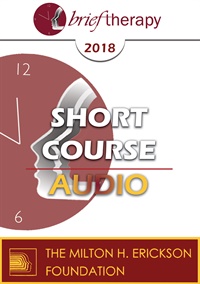
- Average Rating:
- Not yet rated
- Topic Areas:
- Short Courses | Depression | Eating Disorders | Brief Therapy | Hypnotherapy | Weight Loss
- Categories:
- Brief Therapy Conference | Brief Therapy Conference 2018
- Faculty:
- Margot Gotte-El Fartoukh, Dr. phil
- Duration:
- 1:26:23
- Format:
- Audio Only
- Original Program Date:
- Dec 06, 2018
- Short Description:
- The control of body weight is largely remote instinctively. When conscious efforts go nowhere, hypnotherapeutic strategies can open new possibilities. Presented is a model of hypnotherapeutic strategies of weight regulation introduced on the M.E.G. Congress 2018 in Bad Kissingen (Germany).
- Price:
- $15.00 - Base Price
- Average Rating:
- Not yet rated
- Topic Areas:
- Clinical Demonstrations | Ericksonian Hypnosis and Therapy Techniques | Hypnotherapy
- Categories:
- Brief Therapy Conference | Brief Therapy Conference 1998
- Faculty:
- Michael Yapko, PhD
- Course Levels:
- Master Degree or Higher in Health-Related Field
- Duration:
- 56:32
- Format:
- Audio and Video
- Original Program Date:
- Aug 28, 1998
- Short Description:
- This session explores the role of hypnosis in generating therapeutic possibilities, with or without formal trance induction. Emphasizing the view that clients have more resources than they realize, the presentation shows how experiential methods can strengthen self-trust, reduce dependence on external validation, and create openings for growth. Participants gain insight into how hypnosis can be woven into therapy to deepen outcomes.
- Price:
-
Sale is $29.00
price reduced from Base Price - $59.00
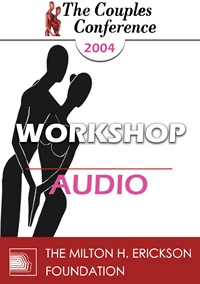
- Average Rating:
- Not yet rated
- Topic Areas:
- Workshops | Couples Therapy | Hypnosis | Hypnotherapy | Experiential Therapy | Unconscious Processes
- Categories:
- Couples Conference | Couples Conference 2004
- Faculty:
- Jeffrey Zeig, PhD
- Duration:
- 1:59:27
- Format:
- Audio Only
- Original Program Date:
- Mar 26, 2004
- Short Description:
- Hypnosis is an experiential method of "gift wrapping" ideas. With or without formal trance, hypnotic methods can be used in the assessment and intervention process of couples therapy.
- Price:
- $15.00 - Base Price
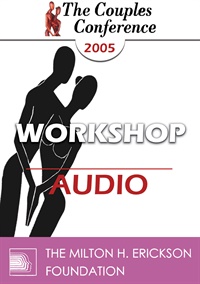
- Average Rating:
- Not yet rated
- Topic Areas:
- Workshops | Couples Therapy | Hypnosis | Hypnotherapy | Experiential Therapy
- Categories:
- Couples Conference | Couples Conference 2005
- Faculty:
- Jeffrey Zeig, PhD
- Duration:
- 2:08:39
- Format:
- Audio Only
- Original Program Date:
- Mar 04, 2005
- Short Description:
- Hypnosis is an experiential method of "gift wrapping" ideas. With or without formal trance, hypnotic methods can be used in the assessment and intervention process of couples therapy.
- Price:
- $15.00 - Base Price
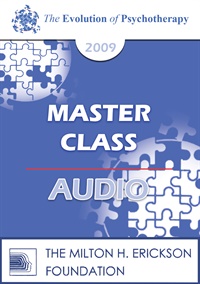
- Average Rating:
- Not yet rated
- Topic Areas:
- Brief Therapy | Experiential Therapy | Gestalt | Hypnosis | Psychotherapy | Ericksonian Hypnosis and Therapy Techniques | Hypnotherapy | Master Classes
- Categories:
- Evolution of Psychotherapy | Evolution of Psychotherapy 2009
- Faculty:
- Jeffrey Zeig, PhD | Erving Polster, PhD
- Duration:
- 2 Hours 49 Minutes
- Format:
- Audio Only
- Original Program Date:
- Dec 14, 2009
- Short Description:
- Gestalt therapy and Ericksonian hypnotherapy are experiential methods of change. In Combination they can be synergistic. Psychotherapy is best when clients have a first hand experience of an alive therapeutic process. Such dynamic empowering experiences pave the way for dynamic understandings. Drs. Polster and Zeig will engage with each other and the participants to examine commonalities and differences in their work.
- Price:
- $15.00 - Base Price




